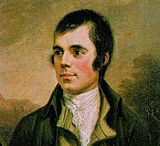Auld Lang Syne

'Auld Lang Syne' is a Scots poem written by Robert Burns in 1788 an set tae the tuin o a tradeetional fowk sang. It is weel kent warldwide an is aften sang for tae celebrate the stairt o the new year at the straik o midnicht on Ne'er's Day.
Leerics
[eedit | eedit soorce]Maist common uiss o the sang involves anerly the first verse an the owerwird. Confuision aboot the exact meanin o the wirds haes led tae a common uiss o 'For the sake o' or 'For the days o' in the last line, maugre o this no bein pairt o the tradeetional leeric.
It shoud be merkit that Burns uises the apologetic apostrophe in his leerics, thon is nou conseedered no richt. Mony o Burns' spellins is mair anglifee'd an/or speceefic tae his dialect. Baith the oreeginal and the modren (see RRSSC) spellins is gien ablo.
| Modren Scots spellin | Burns' oreeginal Scots verse[1] |
|---|---|
|
Shoud auld acquentance be forgot,
An shuirly ye'll be your pint-stowp!
We twa hae rin aboot the braes,
We twa hae paidelt in the burn,
An thare's a haund, ma trusty fere!
|
Should auld acquaintance be forgot,
And surely ye'll be your pint-stowp!
We twa hae run about the braes,
We twa hae paidl'd i' the burn,
And there's a hand, my trusty fiere!
|
Uiss
[eedit | eedit soorce]At New Year
[eedit | eedit soorce]'Auld Lang Syne' is for ordinar sung ilka year at midnicht atween Hogmanay an Ne'er Day) in the Unitit Kinrick, the Republic o Ireland, the Unitit States, Australie, New Zealand, Sooth Africae, Hong Kong, Singapore, Canadae, an Inglish-speakin airts o Indie, Bangladesh an Pakistan, an signifees the stairt o a new year.
In Scotland, it is aften sung at the end o a céilidh or a dance. It is common practice that awbody jynes haunds wi the body neist thaim for tae mak a muckle circle aboot the dance fluir. At the beginnin o the last verse, awbodie crosses thair airms athort thair breest, sae that the richt haund raxes oot tae the neebour on the left an vice versa. Whan the tuin ends, awbody breinges tae the middle, whan aye haudin haunds. Whan the circle is re-estaiblished, awbody turns unner the airms for tae end up facin ootwart wi the haunds still jyned. Ootwi Scotland the haunds is aften crossed frae the beginnin o the sang at variance wi the Scots haunt.
The Scots haunt wis demonstrate by the Queen at the Millennium Dome celebrations for the year 2000. The Inglish press beratit her for no "properly" crossin her airms, unawaur that she was richt.[2][3]
References
[eedit | eedit soorce]- ↑ Maine
- ↑ "One doesn't do tantrums and tiaras - Telegraph". Telegraph.co.uk. Archived frae the original on 5 Mey 2013. Retrieved 25 November 2008.
- ↑ "Queen stays at arm's length". Archive.thisislancashire.co.uk. Retrieved 25 November 2008.
Fermit airtins
[eedit | eedit soorce]| Wikisource haes oreeginal text relatit tae this airticle: |
| Wikisource haes oreeginal text relatit tae this airticle: |
- McKellar, Kenneth. "Auld Lang Syne (in Scots)". Archived frae the original (MP3) on 29 Februar 2008. Retrieved 28 December 2007.
- Auld Lang Syne score Archived 2020-09-26 at the Wayback Machine it National Library of Scotland
- Auld Lang Syne at Allmusic
- Scotland on TV Auld Lang Syne video performance with lyrics Archived 2009-01-14 at the Wayback Machine
Variant leerics
[eedit | eedit soorce]- "Standard English Translation" Archived 2009-01-23 at the Wayback Machine at The World Burns Club
- Multiple versions and tuins Archived 2005-03-15 at the Wayback Machine at The Mudcat Cafe's "Digital Traditions"

